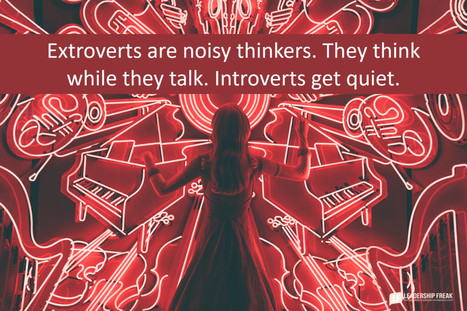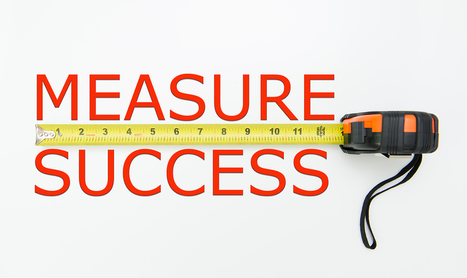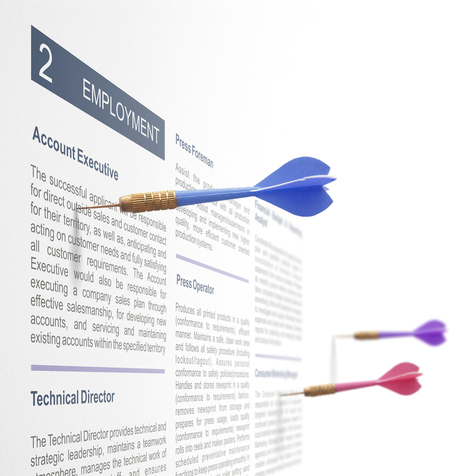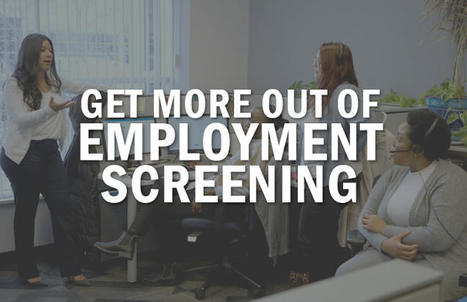 Your new post is loading...
 Your new post is loading...

|
Scooped by
Barry Deutsch
November 30, 2023 6:45 PM
|
Uncover the strategies to excel in talent acquisition and secure top-performing candidates. Master the art of talent hunting with our secrets to successful hiring.

|
Scooped by
Barry Deutsch
May 10, 2022 8:12 PM
|
Presents several practices for cultivating relationships with former employees (Boomerang employees) to make it easier for them to return to the organization.

|
Scooped by
Barry Deutsch
June 12, 2020 4:19 PM
|
How do you ensure you don’t make a mistake when hiring your next employee? By focusing on potential, not experience....

|
Scooped by
Barry Deutsch
June 12, 2020 1:08 PM
|
Quality of hire is one of the most important, but misunderstood recruiting metrics, we’ll show you how to use it properly.

|
Scooped by
Barry Deutsch
February 28, 2019 3:39 PM
|
In 2018, workers quit at the highest rates since 2001, and experts predict that the trend will continue into 2019. But according to LinkedIn's 2019 Workforce Learning Report, 94 percent of employees say that they would stay at a company longer if it simply invested in helping them learn.

|
Scooped by
Barry Deutsch
February 12, 2019 4:37 PM
|
There is a huge amount of content out there that focuses on mistakes that job candidates make when they interview. but hiring managers do too

|
Scooped by
Barry Deutsch
December 9, 2018 6:41 PM
|
Introverts drive extroverts crazy. Or should I say, extroverts drive introverts crazy? “... 65% of senior corporate executives viewed introversion as a barrier to leadership...” (HBR) The blank stare: The scariest thing about an introvert is the blank stare that comes over their face when they’re thinking. It looks like displeasure, dislike, even disdain, to…

|
Scooped by
Barry Deutsch
November 7, 2017 8:27 PM
|
"Lies, Embellishment, and Exaggeration. How many mistakes have you made in hiring candidates whom you lied, embellished, or exaggerated?"

|
Scooped by
Barry Deutsch
October 25, 2017 11:41 AM
|
No one can agree on who to hire because there is NO alignment on what success looks like for a position. Hiring is very simple and easy once we all agree on a common definition of success.

|
Scooped by
Barry Deutsch
October 16, 2017 6:25 PM
|

|
Scooped by
Barry Deutsch
October 11, 2017 2:15 PM
|

|
Scooped by
Barry Deutsch
October 3, 2017 8:54 PM
|
|

|
Scooped by
Barry Deutsch
May 10, 2022 8:17 PM
|
People are your biggest investment. How do you ensure you're getting the right ones? It’s sounds like a cliché, but it’s true: People are your biggest, and often most important, investment. Hiring the right people can transform your business and your bottom line – and hiring the wrong person can end up costing you time, productivity and, ultimately, a lot of money. There’s no foolproof way to avoid hiring mistakes, of course, but pre-employment screening can go a long way to weeding out potential bad apples. However, getting the most out of your pre-employment screening involves more than just making sure candidates on the shortlist sign the consent forms. Here are our tips for making sure your screening program is working harder for you. Put a screening policy in place. If your organization has more than one hiring manager - or if department heads and other managers often make hiring decisions without going through the HR department - it's important to establish and communicate a clear (and concise) screening policy, and ensure that anyone involved in the hiring process is aware of it. This can help reduce the kind of hiring mistakes that happen when inexperienced managers bypass the vetting process. Know what you want to know Many employers engage a screening company to check references and maybe confirm previous employers. But if you’re in a sensitive industry or hiring a senior executive for a specialized role – especially if you’re offering a substantial compensation package – you may want to consider screening that also verifies education and professional credentials. (This is a bigger area for fraud than most employers realize.) Taking the time to consider what you really want and need to know about a candidate could help you avoid a big mistake. Know exactly what the job will involve This seems obvious, but the truth is that in many cases, pre-employment screening isn’t as useful as it could be simply because the screening didn’t include a key qualification or skill, such as a driver’s abstract. If you need the new hire to have a clean driving record or credit history, it’s better to know this during the initial screening process. Be up-front with the candidate about what you’re screening for Being honest with the candidate about what information will be involved in their screening will not only give them a chance to address any potential issues, but will also help to protect you from damages if the candidate is not hired and tries to take action based on ‘improper’ screening. Know what information is a deal-breaker Your prospective new hire got one lukewarm (or even a little negative) reference from a previous employer. Does this automatically disqualify them from consideration if the other references were good? What about if they said they were ‘expert’ in a particular skill but a reference check reveals their skills are probably ‘intermediate’? Knowing what information is really crucial will help you use the screening results more effectively. ...but don't make your checklist too strict Recruiters often tell us about fantastic hires that 'got away' because a potential employer had a checklist of 11 things - but the candidate only ticked 10 of the boxes. If it turns out that an otherwise perfect potential hire has one bad reference from 7 years ago, maybe it's worth asking more questions rather than immediately taking them out of the running. Establish a social media screening policy Lots of great employees occasionally post questionable photos or information to one of their social media channels – that doesn’t mean you shouldn’t hire them. At the same time, social media can blur the line between ‘personal’ and ‘professional’ in ways that can cause risk for employers. Establishing a corporate social media policy that can then be used consistently for pre-employment screening can be an effective way to mitigate this risk without worrying that you’re disqualifying good potential hires for arbitrary reasons. Consider doing in-depth reference checks yourself If all you want to know is whether a prospective hire did in fact hold the position(s) they claim to, then a basic reference check is fine. But if the job requires the kinds of soft skills that aren't easily measured, or needs a specific kind of cultural fit, you may want to follow up the basic reference checks with more detailed conversations with one or two employers from the top one or two candidates. Tags HR HRPA INVESTIGATIONS Investigations NEWS OIAA Profile in the news SCREENING SYSTEMS Screening Uncategorized background screening claims corporate investigations employment screening entry-level fraud insurance investigation investigations legislation news recruiting retention risk management risk mitigation screening sourcing talentmanagement threat assessment tips and tricks trends workplace violence

|
Scooped by
Barry Deutsch
May 10, 2022 8:09 PM
|
Hiring for your company is an important process that brings many potential problems. We take a look at some common hiring mistakes and ways you can avoid them....

|
Scooped by
Barry Deutsch
June 12, 2020 1:15 PM
|
Although the current unemployment rate has spiked up in many areas, hiring a productive salesperson can still be a huge challenge.

|
Scooped by
Barry Deutsch
June 10, 2020 8:23 PM
|
Google. A website, turned verb. The way we learn just about everything now (just Google it). A giant time-waster. Yet also, a treasure trove of information. As recruiters, hiring managers, and people professionals, we tend to rely on Google for solutions to our day-to-day activities.

|
Scooped by
Barry Deutsch
March 3, 2019 12:45 AM
|
You are probably quite adept at resilience in most parts of your life, this article discusses 8 ways you can develop resilience

|
Scooped by
Barry Deutsch
February 27, 2019 8:59 PM
|
CEO confidence has bounced back stemming from robust economic conditions, solid consumer demand, strong earnings, and easy access to capital.

|
Scooped by
Barry Deutsch
February 12, 2019 4:30 PM
|
People are complex. We need a more nuanced approach to predicting job performance.

|
Scooped by
Barry Deutsch
November 8, 2017 12:59 AM
|
"When you don't have a process, random results occur. Sometimes you hit the bulls eye, sometimes you don't". Is it worth taking the risk of missing targets, outcomes and results by letting managers do whatever they want in the hiring process?"

|
Scooped by
Barry Deutsch
November 7, 2017 8:12 PM
|
"If you want the very best candidates you have to fish in the right spot, and fish deeply for them."

|
Scooped by
Barry Deutsch
October 25, 2017 11:32 AM
|
What are the frustrations that drive your crazy about how hiring is done in your organization?

|
Scooped by
Barry Deutsch
October 12, 2017 2:05 PM
|

|
Scooped by
Barry Deutsch
October 9, 2017 12:33 AM
|
|






 Your new post is loading...
Your new post is loading...




























The article is spot on about hiring mistakes by hiring managers and job acceptance mistakes by candidates.
The article focuses on two elements of these errors - one the author got right and the other the other missed.
First, the author suggests that hiring managers may occassionally hire candidates who are less than desirable - DUH! There are a wide variety of reasons for this common problem - we documented these a few years ago in our research project titled "The Top Ten Mistakes CEOs and Executives Make in Hiring" and expanded upon that study in our book "You're NOT the Person I Hired."
The author cites a study that shows 14% of HR professionals having "buyer's remorse" about candidates hired. I'l suggest that after surveying over 30,000 CEOs and Senior Executives in our hiring workshops over the past 25 years, most Executives have "buyer's remorse" on at least 50% of hires within the first year - candidates who cannot perform at expected levels.
The other issue is on the candidate side - candidates who take the wrong job and realize it after the fact. That's a real strong case of buyer's remorse. Here's how it happens and it doesn't have anything to do with an expanding job market and more opportunities as the author claims:
Many candidates accept positions based on a traditional interview of the hiring manager box checking the job description. This is not the real job. In fact, it's not even a description of work most of the time it's more of a people description. However, candidates take jobs thinking that's the real job.
At some point after hiring, 30-90 days, the hiring manager shares his/her expectations of performance with the candidate - who suddenly realizes those expectations were never discussed in the original interview. It's not the job they thought they took! At this point, they realize that they either don't want to do that work OR they can't achieve the desired expectations. They then muddle through until a better opportunity appears in another company. We documented these problems in our Job Search Book titled "This is NOT the Position I Accepted".
When you layer 50% hiring failure by hiring managers alongside 50% candidates taking the wrong job - is it wonder that performance and success metrics within the first year is so bad?
Barry Deutsch
IMPACT Hiring Solutions HIRE and RETAIN Top Talent
http://www.impacthiringsolutions.com/blog
Do you have a FREE Copy of our best selling e-book on how to hire and retain top talent?
http://www.impacthiringsolutions.com/hiring-managers/hiring-products/our-award-winning-book/a-digital-ebook-version
Learn how your success depends on the quality of the team you build and keep by joining us in our LinkedIn Discussion Group on hiring and retaining top talent
http://www.linkedin.com/groups/IMPACT-Hiring-Solutions-HOW-Hire-1819296/about